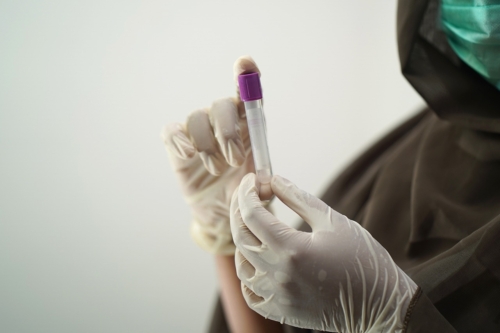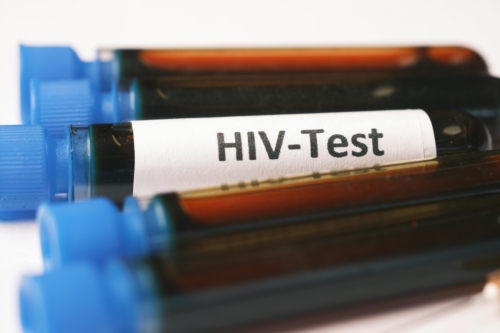
He infected his ex-wife with HIV, was arrested and will now go to trial.
The man, aged 60, had known since 2000 that he was a carrier of the Human Immunodeficiency Virus. Despite this, he had sex with the woman without telling her. She found out at the end of 2019.
Prosecutor René Bosio brought to trial a case against a man who infected his ex-wife with HIV, knowing he was infected, but never told the woman nor took care when having sex.
The accused, aged 60, has been detained since 13 November 2023 and will have to answer in oral proceedings as the alleged perpetrator of the crime of “doubly qualified serious injuries, due to the link and gender violence”. In addition, he will be tried for infringing Law 12.331 on the Prophylaxis of Venereal Diseases and for two acts of “disobedience to authority”.
During the judicial investigation carried out by the Prosecutor’s Office of Instruction of the Third Shift, it was determined that the victim, aged 55, contracted the Human Immunodeficiency Virus from her husband.
During the last months of 2019, the woman suffered serious health problems and lost 23 kilos in a short period of time. And in one of the hospitalisations, in a local clinic, she underwent more complex tests, until finally some blood tests showed her to be HIV positive.
He found out in 2000
On that occasion, the accused himself confessed to the doctor who treated his wife that he had found out about his illness in 2000 when he underwent tests at the Pasteur Regional Hospital, and that he received medication until 2008, when he stopped taking it.
The victim’s health deteriorated and in February 2021 she was diagnosed with a lymphoma tumour, caused by low defences as a result of the virus. In addition, for a long time, the woman suffered psychological abuse and verbal aggression until, finally, the couple’s relationship came to an end.
In early August of last year, she filed a criminal complaint against her ex-husband and three months later, with all the evidence collected in the file, the prosecutor Bosio ordered the arrest of the accused.
He violated a restriction
Prior to this, more precisely on 1 October and 12 November, the subject twice violated a restraining order ordered by the Family Violence Court on 9 August and went to his ex-partner’s home, thus committing the crime of “disobedience to authority”.
The second violation of this court order was the straw that broke the camel’s back, as the following day he was arrested and since then he has been deprived of his liberty, lodged in the Belgrano neighbourhood prison.
In the order of elevation to trial, the prosecutor highlights that “the accused, knowing himself to be a carrier of HIV and knowing that it is a venereal, transmissible and incurable disease, infected his wife through sexual relations maintained during the marriage inside the home they shared, repeatedly, without using a condom or ever warning the victim of this circumstance, infecting her with the Human Immunodeficiency Virus”.
What the law says
Article 18 of Law 12.331 establishes that “the penalty established in article 202 of the Penal Code (CP) shall be imposed on anyone who, knowing that they are affected by a transmissible venereal disease, transmits it to another person”. And this legal provision specifies that “anyone who spreads a disease that is dangerous and contagious to people shall be punished with imprisonment or imprisonment of three to 15 years”.
In Argentinean law, “extremely serious injuries” are defined as those that cause extreme damage to the victim’s health, such as serious incapacity, loss of a sense, organ or limb, incurable illness, mental or physical illness that is certain or probably incurable, permanent inability to work, loss of the use of an organ or limb, loss of speech, and loss of the capacity to engender or conceive.
In this regard, article 91 of the PC states that “imprisonment of three to 10 years shall be imposed if the injury results in a certain or probably incurable mental or physical illness, permanent incapacity for work, loss of a sense, an organ, a limb, the use of an organ or limb, loss of speech or the capacity to engender or conceive”.
Finally, the crime of “disobedience to authority” is legislated by article 239 of the Penal Code and states that “anyone who resists or disobeys a public official in the legitimate exercise of his duties or the person who assists him at his request or by virtue of a legal obligation shall be punished with imprisonment of 15 days to one year”.
Contagió a su exesposa de VIH, fue detenido y ahora irá a juicio
Se trata de un hombre de 60 años, quien desde el año 2000 sabía que era portador del Virus de Inmunodeficiencia Humana. A pesar de ello, mantuvo relaciones con la mujer sin decirle nada. Ella se enteró a fines de 2019.
El fiscal René Bosio elevó a juicio una causa que se le sigue a un hombre que contagió de VIH a su exesposa, sabiendo que estaba infectado, pero nunca se lo dijo a la mujer ni se cuidó a la hora de mantener relaciones sexuales.
El acusado, de 60 años, está detenido desde el 13 de noviembre de 2023 y deberá responder en juicio oral como presunto autor del delito de “lesiones gravísimas doblemente calificadas, por el vínculo y por violencia de género”. Además, será juzgado por infringir la Ley 12.331 de Profilaxis de Enfermedades Venéreas y por dos hechos de “desobediencia a la autoridad”.
Durante la investigación judicial desarrollada en la Fiscalía de Instrucción del Tercer Turno, se determinó que la víctima, de 55 años, contrajo el Virus de Inmunodeficiencia Humana por medio de quien era su marido.
Durante los últimos meses de 2019, la mujer sufrió serios problemas de salud y llegó a bajar 23 kilos en poco tiempo. Y en una de las internaciones, en una clínica local, le hicieron unos estudios de mayor complejidad, hasta que finalmente unos análisis de sangre dieron como resultado VIH positivo.
Se enteró en el 2000
En esa oportunidad, el propio imputado terminó confesándole a la médica que atendía a su esposa que se había enterado de su enfermedad en el año 2000 al hacerse los estudios en el Hospital Regional Pasteur, y que recibió medicación hasta 2008, cuando dejó de tomarla.
La salud de la víctima fue empeorando y en febrero de 2021 le detectaron un tumor linfoma, generado a raíz de las defensas bajas provocadas por el virus. Además, durante mucho tiempo, la mujer sufrió maltrato psicológico y agresiones verbales hasta que, finalmente, la relación de pareja llegó a su fin.
En los primeros días de agosto del año pasado radicó una denuncia penal en contra de su exmarido y tres meses después, con toda la prueba colectada en el expediente, el fiscal Bosio ordenó la detención del imputado.
Violó una restricción
Previo a ello, más precisamente los días 1 de octubre y 12 de noviembre, el sujeto incumplió en dos ocasiones una medida de restricción de acercamiento dispuesta por el Juzgado de Violencia Familiar el 9 de agosto y se presentó en el domicilio de su expareja, incurriendo así en el delito de “desobediencia a la autoridad”.
La segunda violación de esa disposición judicial fue la gota que rebalsó el vaso, ya que al día siguiente fue aprehendido y desde entonces se encuentra privado de la libertad, alojado en la cárcel de barrio Belgrano.
En el auto de elevación a juicio, el fiscal destaca que “el imputado, sabiéndose portador de VIH y conociendo que se trata de una enfermedad venérea, transmisible e incurable, contagió a su esposa mediante relaciones sexuales mantenidas durante el matrimonio en el interior del domicilio que compartían, en forma reiterada, sin utilizar preservativo ni advertir nunca a la víctima de esa circunstancia, contagiándola del Virus de Inmunodeficiencia Humana”.
Qué dice la ley
El artículo 18 de la Ley 12.331 establece que “será reprimido con la pena establecida en el artículo 202 del Código Penal (CP) quien, sabiéndose afectado de una enfermedad venérea transmisible, la contagia a otra persona”. Y dicha norma legal precisa que “será reprimido con reclusión o prisión de tres a 15 años el que propagare una enfermedad peligrosa y contagiosa para las personas”.
En la legislación argentina las “lesiones gravísimas” se definen como aquellas que causan un daño extremo a la salud de la víctima, como incapacidad grave, la pérdida de un sentido, órgano o miembro, una enfermedad incurable, una enfermedad mental o corporal cierta o probablemente incurable, la inutilidad permanente para el trabajo, la pérdida del uso de un órgano o miembro, la pérdida de la palabra, y pérdida de la capacidad de engendrar o concebir.
Al respecto, el artículo 91 del CP sostiene que “se impondrá prisión de tres a 10 años si la lesión produjere una enfermedad mental o corporal, cierta o probablemente incurable, la inutilidad permanente para el trabajo, la pérdida de un sentido, de un órgano, de un miembro, del uso de un órgano o miembro, de la palabra o de la capacidad de engendrar o concebir”.
Finalmente, el delito de “desobediencia a la autoridad” es legislado por el artículo 239 del Código Penal y señala que “será reprimido con prisión de 15 días a un año el que resistiere o desobedeciere a un funcionario público en el ejercicio legítimo de sus funciones o a la persona que le prestare asistencia a requerimiento de aquel o en virtud de una obligación legal”.



